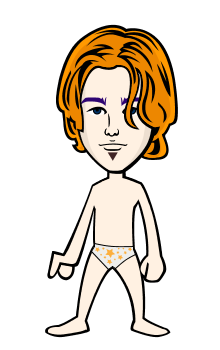What I Wish I Could Change About My Children
Hallie Levine
20 January 2016
“I need to speak to you about your child.”
The usher looked at me with a pained expression. I nodded and stood up. I was at a dance performance in New York City with my 7-year-old daughter, Jo Jo. I glanced at my little girl, sitting expectantly in her purple-and-pink tutu, and wondered what she could have done to make him look as if he was about to go in front of a firing squad. “There have been some complaints about your daughter,” he said finally, not meeting my eyes. “People are upset. She’s making noise.”
STORY: ‘Incredible’ Way Model’s Life Changed Forever After Son’s Down Syndrome Diagnosis
I was surprised. There were moments in the performance when Jo Jo, who loves music, had gotten carried away by a scene and cheered, or burst into applause at the end of a dance. I had tried to quiet her, but didn’t think she was loud enough to be considered disruptive. “I’m so sorry,” I said. “She’s just excited; she absolutely loves the show.”
STORY: Why I Terminated My Pregnancy After Learning My Baby Had Down Syndrome
I didn’t state the next part, which seemed obvious: She has Down syndrome, and might not have always gotten the intricacies of when it was appropriate to applaud. Out of the corner of my eye, I saw Jo Jo, waiting in her seat, her arms fluttering with anticipation. I noticed people staring; some benignly, some curiously, some with overt hostility. I flinched. On the one hand, I felt strongly that Jo Jo had as much of a right to be there as anyone else. On the other hand, I didn’t want her to be exposed to their glowering for the rest of the performance.
“Can you reseat us?” I asked simply. The usher agreed to move us, out of our prime sixth-row center orchestra seats, further back towards the rear of the theater, on condition that we leave immediately if Jo Jo made any noise. I argued with him on the last part — it seemed outrageous to me that she could be kicked out for clapping — but I agreed. Sure enough, a few minutes into the performance, Jo Jo cheered and applauded at the “wrong” moment. The man in front of us turned around, shot her a dagger-like stare, and shushed her so vehemently spit from his mouth landed on her forehead.
My daughter stared at him indignantly. “You shhhh,” she said, loudly. He growled, and she gave a startled shrill yelp. The people around us began grumbling in anger. As I exited, Jo Jo, crying and protesting in my arms, I heard a woman in the row ahead of me say softly to Jo Jo’s new nemesis: “I think she has Down syndrome.” “I don’t give a damn,” the man spat out, loudly. “Even more reason for her not to be in here.”
When we walked out of the theater, Jo Jo was a tearful mess, and I was seething. I was furious that we had to leave, and that she’d been berated by an ignorant jerk who had been equally disruptive (and no one was kicking him out for it). And I felt terrible that my daughter’s little heart was broken as she sat on the floor of the lobby, sobbing in her now snot-covered tutu, wondering why she’d been forced to leave her beloved “ba-a-let.” From her perspective, she hadn’t done anything wrong.
It was a gut-wrenching moment, for both of us. And unfortunately, episodes like this, for my family, aren’t isolated incidents. Jo Jo isn’t my only child with a disability. She has two younger brothers, both of whom have their own special needs. My oldest son, Teddy, has several life-threatening food allergies, as well as a speech impediment, while my youngest son, Geoffrey, has a condition called albinism, where his body produces low levels of pigment, leaving him visually impaired. They all have vastly different issues, each carrying with them their own set of physical and mental challenges. And in the spirit of perfect honesty, I often wish none of my children had them.



